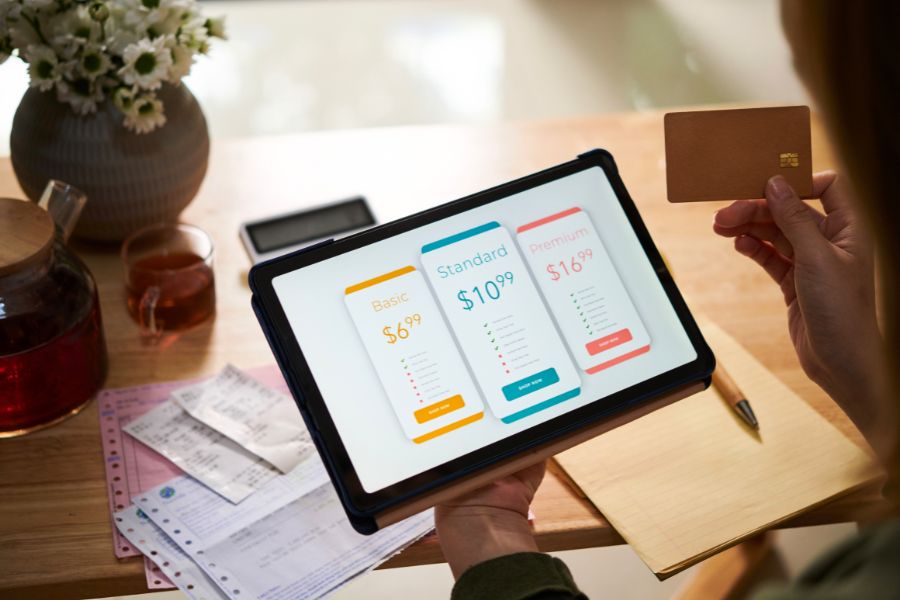This post is all about 15 habits that waste money and what you can do to avoid them.

We all have those moments when we check our bank account and wonder, “Wait, where did all my money go?!”
More often than not, the culprit isn’t some big flashy purchase. It’s those sneaky purchases that actually drain your wallet without you even realizing it.
In this post, we will go through some common money-wasting habits, why they’re so tempting, and how to kick them to the curb.
Read on to stop wasting your hard-earned money and start saving up instead!
15 Habits That Waste Your Money
1. Impulse Buying
I am sure you’ve found yourself scrolling through Instagram, seeing an ad for a gadget, and convincing yourself you absolutely need it.
This is what we call impulsive buying. It is fueled by the thrill of instant gratification, and often leads to regret and clutter.
The most impulsive buys end up gathering dust.
Here’s how you can quit impulse buying:
- Implement a 24-hour rule: If you see something you want, wait a day before purchasing. More often than not, the initial excitement will fade away.
- Unsubscribe from email lists that bombard you with sales and cause temptation.
- Make a shopping list and stick to it, whether you’re buying groceries or browsing online. You can also set specific spending limits for each shopping trip.
- Avoid shopping during emotional highs and lows. Such purchases are made to fill a temporary void or celebrate a moment, which might not justify the expense.
2. Ignoring Subscriptions You Don’t Use
Streaming services, gym memberships, and monthly boxes are convenient, but how many of these do you actually use?
Those $10, $15, or $50 charges can add up real fast, especially if you forget about them altogether. It’s easy to sign up and harder to remember to cancel.
Here’s how to organize your subscriptions:
- Do a subscription audit. Write down all your subscriptions and cancel the ones you rarely use. Check your bank statement for hidden recurring charges.
- Use apps like Truebill or Rocket Money to track and manage recurring payments. These apps will also notify you of price increases.
- Opt for pay-as-you-go plans when possible. For example, instead of paying monthly for a service, rent or purchase content as needed.
- Set calendar reminders for free trials so that you can cancel before they are renewed.

3. Eating Out Too Often
Sure, grabbing takeout or dining at your favorite restaurant is fun, but those bills can snowball quickly when you’re not keeping track.
Plus, restaurant meals often come with hidden costs like service charges and tips.
To avoid eating out too much:
- Set a dining-out budget. Allocate a specific amount you can spend each month on eating out. Stick to this budget no matter what.
- Learn to cook some go-to meals at home that feel indulgent and are also wallet-friendly. You can totally recreate your favorite restaurant dishes, you know.
- Prep meals in advance to avoid the temptation of ordering out after a busy day. Invest in quality meal storage containers to make leftovers more appealing.
- Plan themed cooking nights with friends and family to make eating at home more fun.
4. Overpaying For Convenience
Paying for delivery, buying pre-cut fruits, and choosing individually packaged snacks may save time, but it costs significantly more.
Convenience often comes at the expense of long-term financial stability.
Here’s how to stop:
- First of all, start planning ahead. If you know you’ll be busy, cook in batches and prepare your snacks at home. Make it a weekend ritual to prepare snacks for the week ahead.
- Opt for store-brand items, which are often just as good as name brands. Test a few alternatives to find your favorites.
- Limit your reliance on delivery apps by setting a monthly cap or just delete your apps. Instead, go for pick-up options that waive delivery fees.
- Invest in kitchen gadgets like a food processor and a slow cooker to save time while cooking from scratch.
5. Not Shopping Around for Deals
Sticking with the same store or brand may be convenient, but this habit can cost you.
This applies to insurance, utilities, clothes, and even big purchases.
I have often purchased items from an online store only to find out that it sold at a much cheaper price on another website.
Here is how you can do better:
- Compare all the prices online before committing to a purchase.
- Use cashback apps or browser extensions like Honey or Rakuten to find discounts. These tools will alert you to savings you didn’t even know existed.
- Don’t be afraid to negotiate. You’ll be surprised how often companies are willing to lower their prices to keep you as a customer. Call and ask for discounts or loyalty rewards and see how that goes.
- Look for seasonal sales and clearance events to stock up on essentials.

6. Falling For Sales and Discounts
“It’s 50% off! I’m basically saving money!”
Sound familiar? That’s what sales and discount signboards scream whenever you see them.
Retailers design sales to create a sense of urgency and excitement.
But the truth is, if you weren’t planning to buy until you saw the ‘discount’ sign, you’re not saving, you’re just spending.
Here’s how to stop falling for discounts:
- Ask yourself, “Would I buy this at full price?” If the answer is no, skip it.
- Make a wish list and stick to it, even during the sale season. This will help you prioritize what you actually need.
- Focus on quality over quantity to avoid buying things you’ll regret later. Invest in fewer and better items that last longer.
- Practice mindful shopping by setting specific goals and reminding yourself of your financial priorities before entering a store. I do this and it works.
RELATED POST: 21 Fun Things To Do With Little To No Money
7. Letting Food Go To Waste
Throwing away spoiled groceries or uneaten leftovers is like tossing cash in the trash.
Now, of course, you can’t consume things that have gone bad, but why are you letting things go bad in the first place?
This points to a lack of smart shopping and obviously leads to great waste of money.
Here is how to be better with your food:
- Plan your meals and shop with a list to avoid buying unnecessary items. Use apps like Mealime or Paprika to streamline planning.
- Store food properly to extend its shelf life. For example, use airtight containers and learn the best storage methods for different produce.
- Embrace leftovers by getting creative with recipes. Turn yesterday’s roasted chicken into today’s soup or tacos.
- Check expiration dates before buying and rotate older items to the front of your fridge or pantry.
8. Relying On Credit Cards For Non-Essentials
Do you swipe your credit card for every little thing? If yes, then you’re making it very easy for your mind to lose track of how much you’re spending.
Not to mention, the interest charges can also pile up if you don’t pay off your balance in time.
Do this to be more credit-card independent:
- Use cash or a debit card for discretionary spending. The physical act of handing over cash will make you think twice before making a purchase.
- Set a limit on your credit card for non-essentials and stick to it. Many cards allow you to set spending alerts, so use this feature, my friend.
- Pay off your balance each month to avoid interest fees. If you can’t pay in full, just try to pay more than the minimum.
- Keep a spending journal to understand your habits and identify areas for improvement.

9. Paying Late Fees
Whether it’s a missed bill payment or an overdue library book, late fees are an unnecessary drain on your finances.
But the good thing is, they’re easy to avoid with a bit of organization.
Here’s how to avoid late fees:
- Set up autopay for recurring bills to ensure they’re paid on time. Review your statements monthly to avoid errors.
- Use calendar reminders or budgeting apps to track due dates. Tools like Mint can send notifications for upcoming bills.
- If you’re frequently late, ask for bill due dates to be aligned with your payday. Many service providers offer flexible scheduling.
10. Buying Things You Don’t Really Need
Retail therapy can feel good at the moment, but those unnecessary purchases can make it super hard to stick to a budget.
This habit is also why so many people live paycheck to paycheck and have little to no savings.
Over time, these unnecessary purchases can really clutter your space and deplete your funds.
Here’s how to stop:
- Declutter your space regularly to remind yourself of what you already own. This will stop the urge to buy duplicates.
- Before buying, ask yourself if it’s a need or a want. You can use a checklist to evaluate potential purchases.
- Avoid shopping when you’re stressed, bored, and emotional. Please find healthier ways to cope, like exercising and journaling.
- Challenge yourself to a “no-buy month” wherein you don’t buy anything you don’t need. This will reset your spending habits.

11. Skipping Regular Maintenance
I know maintenance can seem pricy, but when you avoid it and something breaks down, the cost of repair is much much higher.
Whether it’s your car, home, or even your health, anything that needs maintenance should be maintained on time to avoid extra expenditure down the road.
Preventive care saves money in the long run, always remember.
Here’s how to be regular with maintenance:
- Schedule routine check-ups and tune-ups. Mark your calendar with reminders.
- Invest in preventive measures like regular oil changes or annual physicals. Small steps can prevent major expenses.
- Create a maintenance calendar to stay on top of tasks. Include everything from HVAC servicing to dental cleanings.
- Learn basic DIY maintenance skills to save on minor repairs.
12. Buying Name Brands Over Generic
While some name-brand items are worth the splurge, many generic products are just as good and significantly cheaper.
Branding often drives up the price without adding value, so you should really learn to curb your urge to go for big-name brands only.
Do this:
- Compare the ingredients and specifications of generic versus name-brand items. You’ll often find they’re nearly identical.
- Test generic versions of your favorite products to see if you notice a difference. Many stores offer satisfaction guarantees.
- Prioritize quality over branding when making purchases. Look for reviews and recommendations.
- Stock up on generic staples like over-the-counter medications, pantry items, and cleaning supplies. This way, you won’t be tempted to buy these things from brand stores when you visit them.
13. Ignoring Energy Efficiency
Habits like leaving lights on, running old appliances, and blasting the AC can inflate your energy bills so fast.
I am always going around my house turning off unnecessary lights, as it’s a habit my father taught me growing up.
The savings from this may seem small, but small steps are what lead to great savings in the long term.
Here is how to be more energy efficient:
- Switch to energy-efficient appliances and light bulbs. Look for ENERGY STAR-rated products.
- Turn off lights and unplug devices when not in use. Power strips with switches make this easier.
- Use a programmable thermostat to optimize heating and cooling, and set it to adjust while you’re away or asleep.
- Seal your windows and doors to prevent drafts. This will reduce your heating and cooling costs.

14. Falling For “Buy Now, Pay Later” Schemes
While ‘buy now, pay later’ deals may sound exciting, they can lead to overspending and unexpected debt.
The low monthly payments often mask the true cost of the purchase.
Here is how to dodge these schemes:
- Avoid financing options for non-essential purchases. Pay in full whenever possible to avoid hidden fees.
- Save up for bigger purchases to avoid relying on credit. Create a dedicated savings goal.
- Keep track of payment schedules to avoid missing deadlines. Missed payments can result in steep penalties.
- Educate yourself on the total cost of these schemes, including interest and fees.
15. Overusing Your Car
I have only recently learned to drive the car (I know, I am late to the party), and so I get the urge to drive everywhere when it’s so convenient.
But one ride to the petrol station convinces me to be more mindful of driving, so I am being more mindful of it.
Driving everywhere, even when it’s unnecessary, can lead to higher fuel and maintenance costs. It’s also not always the most efficient option.
Here is how to stop overusing your car:
- Walk/bike for short trips to save money and improve your health. Many errands, like picking up groceries or visiting a nearby cafe, can be done without using your vehicle.
- Combine errands into one trip to save time and fuel. Use apps to map the most efficient path.
- If available, consider buses, trains, or ride-sharing services for regular commutes or special trips.
- Share rides with friends or colleagues, especially for work commutes and group outings.
- Keep your vehicle well-maintained (like keeping tired inflated and regular oil changes). This will improve fuel efficiency and reduce long-term repair costs too.
Read next: 15 Hobbies That Make Money And Are Excellent For A Side Income
It’s High Time To Stop Wasting Your Money
So, these were 15 of the most common habits that waste money.
The last thing I want to add is that money is not easy to earn, whether you’re in a job that pays well or struggling a bit.
So, please respect your money so that it can respect you in return.
I hope the tips help you avoid wasting your money. If you have anything to add, feel free to leave your thoughts in the comment box below.





This particular is a must-read article! The advice on using a high-interest savings account is genius. I’ve been using one for a long time, and it’s made a huge difference. I also created a free tool to evaluate accounts, which your readers might find useful. Great job!